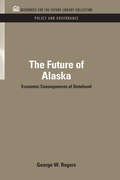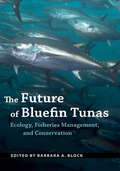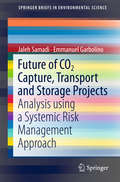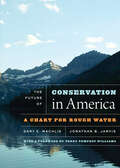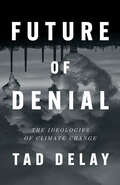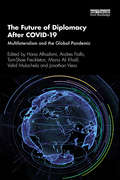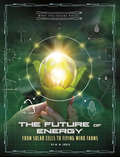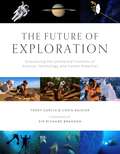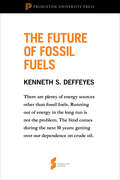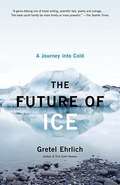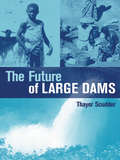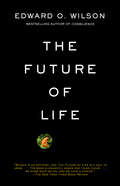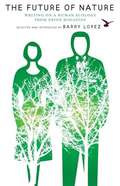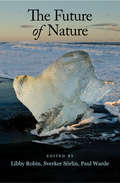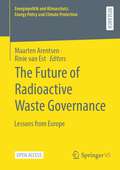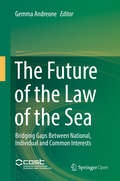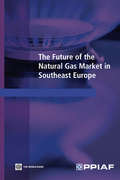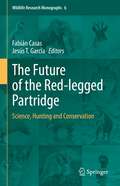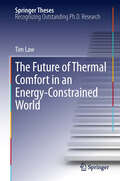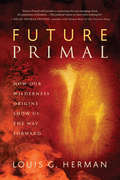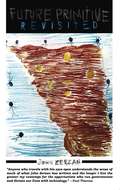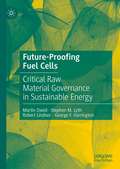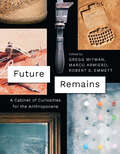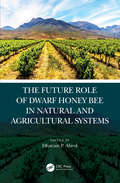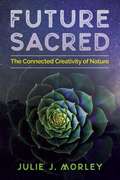- Table View
- List View
The Future of Alaska: Economic Consequences of Statehood (RFF Policy and Governance Set)
by George RogersThis book is both a discussion of key decisions Alaskans must make in coming years and a case study of problems of public finance and policy that accompany shifts in power. Originally published in 1962
The Future of Bluefin Tunas: Ecology, Fisheries Management, and Conservation
by Barbara A. BlockThe most thorough and current account of scientific research on bluefin tunas—the largest, most sought-after tunas in the worldBluefin tunas are dominant keystone predators known for their impressive size, strength, endurance, and speed. Electronic tags have revealed that they can dive to great depths (over 6000 feet) and migrate vast distances—from frigid subpolar seas to warm tropical waters—for spawning. Prized for their rich taste and unique texture, bluefin tunas are also a worldwide commodity of great value. However, over the past few decades, overfishing throughout their range has led to significant population reductions.In The Future of Bluefin Tunas, Barbara A. Block brings together renowned bluefin experts from 15 different countries to share the latest information on the science, fisheries policy, and management decisions related to each of the three species within the Thunnus group—Atlantic, Pacific, and Southern. Synthesizing basic and applied research, the book delves into every aspect of these majestic fish, from their life history and genetic makeup to their ecology and migrations. Ichthyologists and marine scientists dedicated to the study of these fishes report on the latest stock assessments, explore the results of advances such as biologging and DNA sampling, and assess the potential of bluefin tuna aquaculture.The Future of Bluefin Tunas provides critical research findings to inform decisions that will impact tunas and the ocean ecosystems they affect. Scientists, fisheries managers, policymakers, and marine conservationists will take away key data from this timely volume to help them ensure these remarkable fish continue in perpetuity.
Future of CO2 Capture, Transport and Storage Projects: Analysis Using A Systemic Risk Management Approach (SpringerBriefs in Environmental Science)
by Jaleh Samadi Emmanuel GarbolinoThis book presents a summary of a three-year research project on risk management for the Capture, Transport and Storage of CO2 (CTSC), offering an in-depth study on complex sociotechnical systems and systemic modeling. Approaching CTSC as a complex sociotechnical system, this book proposes systemic modeling as a decision-making aid. It offers a means of decision-making for the development of CTSC projects in the real-world context, where the future of the technology is uncertain. Risk management is considered as a means of control that can provide a control structure for the whole system.The risks associated with CTSC are not exclusively technical in nature; CTSC also faces a number of further uncertainties, from development to commercial scales.A major question concerning CTSC at the current scale of development is: "What are the factors explaining the success or failure of CTSC projects in different contexts?" In order to answer this question, the book proposes a systemic risk management framework based on the system dynamics and STAMP (Systems-Theoretic Accident Model and Processes) concepts.
The Future of Conservation in America: A Chart For Rough Water, With A Foreword By Terry Tempest Williams
by Terry Tempest Williams Gary E. Machlis Jonathan B. JarvisThis is a turbulent time for the conservation of America’s natural and cultural heritage. From the current assaults on environmental protection to the threats of climate change, biodiversity loss, and disparity of environmental justice, the challenges facing the conservation movement are both immediate and long term. In this time of uncertainty, we need a clear and compelling guide for the future of conservation in America, a declaration to inspire the next generation of conservation leaders. This is that guide—what the authors describe as “a chart for rough water.” Written by the first scientist appointed as science advisor to the director of the National Park Service and the eighteenth director of the National Park Service, this is a candid, passionate, and ultimately hopeful book. The authors describe a unified vision of conservation that binds nature protection, historical preservation, sustainability, public health, civil rights and social justice, and science into common cause—and offer real-world strategies for progress. To be read, pondered, debated, and often revisited, The Future of Conservation in America is destined to be a touchstone for the conservation movement in the decades ahead.
Future of Denial: The Ideologies of Climate Change
by Tad DeLay"Tad DeLay is one of the most important and disquieting theorists of consciousness and politics writing today. His work is indispensable."—China Miéville, author of OctoberCapitalism is an ecocidal engine constantly regenerating climate change denialThe age of denial is over, we are told. Yet emissions continue to rise while gimmicks, graft, and green- washing distract the public from the climate violence suffered by the vulnerable. This timely, interdisciplinary contribution to the environmental humanities draws on the latest climatology, the first shoots of an energy transition, critical theory, Earth&’s paleoclimate history, and trends in border violence to answer the most pressing question of our age: Why do we continue to squander the short time we have left?The symptoms suggest society&’s inability to adjust is profound. Near Portland, militias incapable of accepting that the world is warming respond to a wildfire by hunting for imaginary left-wing arsonists. Europe erects nets in the Aegean Sea to capture migrants fleeing drought and war. An airline claims to be carbon neutral thanks to bogus cheap offsets. Drone strikes hit people living along the aridity line. Yes, Exxon knew as early as the 1970s, but the fundamental physics of carbon dioxide warming the Earth was already understood before the American Civil War.Will capitalists ever voluntarily walk away from hundreds of trillions of dollars in fossil fuels unless they are forced to do so? And, if not, who will apply the necessary pressure?
The Future of Diplomacy After COVID-19: Multilateralism and the Global Pandemic
by Hana AlhashimiThis book considers the impact of the COVID-19 pandemic on international diplomacy, and the challenges and opportunities it presents for the future of multilateralism. Global cooperation and solidarity are central to responding to and mitigating the health and socio-economic effects of the COVID-19 pandemic, yet, to many, this was slow to mobilize and lacking in political leadership. This book takes a practical look at the lessons learned from the period spanning the World Health Organization’s first declaration of a public health emergency of international concern in January 2020, to the commemoration of the 75th Anniversary of the United Nations in October 2020. This timespan covers a critical period in which to consider key areas of diplomacy, covering a range of tools of global cooperation: multilateral diplomacy, the rule of law, sustainable development, economics and financing, digital governance, and peace and security. Each chapter in this book introduces readers to the current situation in their respective areas, followed by a constructive consideration of lessons learned from the pandemic’s impact on that field, and key recommendations for the future. The practical focus and future orientation is particularly important as the book injects pragmatism and guidance that will facilitate ‘building back better’ in COVID response plans, while creating space for continued focus on global commitments around sustainable development and the future of the UN. Written by a team of authors who have worked directly in International Public Policy and the establishment of global agendas at the United Nations, this book will be essential reading for professionals and policymakers involved in diplomatic roles, as well as students and scholars interested in the future of international relations, global governance and sustainable development.
The Future of Energy: From Solar Cells to Flying Wind Farms (What the Future Holds)
by M. M. EbochOur world runs on energy! But traditional fossil fuels are doing great damage to the environment, and they will eventually run out. How might solar, water, wind and geothermal power come to our rescue? Readers can discover how different the world could look in the future with energy sources that are clean and renewable.
The Future of Exploration: Discovering the Uncharted Frontiers of Science, Technology, and Human Potential
by Chris Rainier Terry GarciaAt this very moment, explorers in some of the most remote and dangerous places on earth, from the deepest parts of the ocean, to the highest mountains, and to outer space are enduring unimaginable hardships to expand our knowledge and save what is truly important.Join former National Geographic Executive Vice President and Chief Science Officer Terry Garcia and nature and cultural photographer Chris Rainier, a National Geographic Explorer, on a journey with some of the world&’s most renowned and respected explorers, scientists, astronauts, visionaries, thinkers, and authors as they discuss and share their insights about what motivates them, what is left to explore, and why we should care in The Future of Exploration. Exploration is as old as humankind, but there are still surprises that await us. With technology opening doors that once seemed permanently closed, the twenty-first century will be the greatest age of exploration in our history. Accompanied with awe-inspiring photography, each contributor shares their personal achievements and insight into what the future of exploration looks like from their respective fields, the challenges we face, and possible solutions. Whether delving into the terrestrial, oceanic, or cosmic frontiers, embark on a journey into the uncharted future and be inspired yourself to be a part of the future of exploration.
The Future of Fossil Fuels: From Hubbert's Peak (Princeton Shorts #4)
by Kenneth S. DeffeyesAs debates about the effects of fossil fuels on our climate and foreign policy intensify, the question of just how much longer we can depend on this finite source of energy becomes more and more pressing. This selection from Hubbert's Peak, the leading book on the limits of our oil supply, forecasts what the future will bring for fossil fuels and what the alternatives are likely to be. Princeton Shorts are brief selections excerpted from influential Princeton University Press publications produced exclusively in eBook format. They are selected with the firm belief that while the original work remains an important and enduring product, sometimes we can all benefit from a quick take on a topic worthy of a longer book. In a world where every second counts, how better to stay up-to speed on current events and digest the kernels of wisdom found in the great works of the past? Princeton Shorts enables you to be an instant expert in a world where information is everywhere but quality is at a premium. The Future of Fossil Fuels does just that.
The Future of Ice: A Journey into Cold
by Gretel EhrlichTo understand the complex, primal nature of cold, Ehrlich traveled to extreme points, from Tierra del Fuego to the Arctic circle. In this volume she reports on her experiences of the many expressions of cold--wind, water, snow and ice--and describes the history of these elements and of ocean currents and weather cycles. She attempts to uncover through her experiences the quintessential connection between humans and the physical world. Annotation ©2004 Book News, Inc. , Portland, OR (booknews. com)
The Future of Large Dams: "Dealing with Social, Environmental, Institutional and Political Costs"
by Thayer Ted ScudderViewed by some as symbols of progress and by others as inherently flawed, large dams remain one of the most contentious development issues on Earth. Building on the work of the now defunct World Commission on Dams, Thayer Scudder wades into the debate with unprecedented authority. Employing the Commission's Seven Strategic priorities, Scudder charts the 'middle way' forward by examining the impacts of large dams on ecosystems, societies and political economies. He also analyses the structure of the decision-making process for water resource development and tackles the highly contentious issue of dam-induced resettlement, illuminated by a statistical analysis of 50 cases.
The Future of Life
by Edward O. WilsonOne of the world’s most important scientists, Edward O. Wilson is also an abundantly talented writer who has twice won the Pulitzer Prize. In this, his most personal and timely book to date, he assesses the precarious state of our environment, examining the mass extinctions occurring in our time and the natural treasures we are about to lose forever. Yet, rather than eschewing doomsday prophesies, he spells out a specific plan to save our world while there is still time. His vision is a hopeful one, as economically sound as it is environmentally necessary. Eloquent, practical and wise, this book should be read and studied by anyone concerned with the fate of the natural world.
The Future of Nature: Writing on a Human Ecology from Orion Magazine
by Barry LopezThe western mindset is arguably one of the greatest threats to the world's ecological balance. Corporatism and globalization are two of the obvious villains here, but what part does human nature play in the problem? Since its inception in 1982, "Orion" Magazine has been a forum for looking beyond the effects of ecological crises to their root causes in human culture. Less an anthology than a vision statement, this timely collection challenges the division of human society from the natural world that has often characterized traditional environmentalism. Edited and introduced by Barry Lopez, "The Future of Nature" encompasses such topics as local economies, the social dynamics of activism, America's incarceration society, naturalism in higher education, developing nations, spiritual ecology, the military-industrial landscape, and the persistent tyranny of wilderness designation. Featuring the fine writing and insights for which "Orion" is famous, this book is required reading for anyone interested in a livable future for the planet.
The Future of Nature
by Paul Warde Sverker Sorlin Libby RobinThis anthology provides a comprehensive overview of the science behind environmental prediction and how, as predictions about environmental change have been taken more seriously and widely, they have affected politics, policy, and public perception. Through an array of texts and commentaries that examine the themes of progress, population, environment, biodiversity, and sustainability from a fully global perspective, it shows how twenty-first century predictors think about what forecasting the future means. Providing access and reference points to the origins and development of key disciplines and methods, it will encourage policy makers, professionals, and students to reflect on the roots of their own theories and practices.
The Future of Radioactive Waste Governance: Lessons from Europe (Energiepolitik und Klimaschutz. Energy Policy and Climate Protection)
by Maarten Arentsen Rinie Van EstThis Open Access book examines the radioactive waste management policies of ten European countries: Belgium, Finland, France, Germany, Italy, the Netherlands, Spain, Sweden, Switzerland and the United Kingdom. Most countries are in the process of planning and creating final storage solutions, while none has yet finalized this process. Over the past decades many countries have been renewing their decision-making processes and the institutions that support them. The book provides 16 lessons that may advance the future democratic decision-making process around radioactive waste management.
The Future of the Law of the Sea
by Gemma AndreoneThis book is open access under a CC BY-NC 4. 9 license. It explores the diverse phenomena which are challenging the international law of the sea today, using the unique perspective of a simultaneous analysis of the national, individual and common interests at stake. This perspective, which all the contributors bear in mind when treating their own topic, also constitutes a useful element in the effort to bring today's legal complexity and fragmentation to a homogenous vision of the sustainable use of the marine environment and of its resources, and also of the international and national response to maritime crimes. The volume analyzes the relevant legal frameworks and recent developments, focusing on the competing interests which have influenced State jurisdiction and other regulatory processes. An analysis of the competing interests and their developments allows us to identify actors and relevant legal and institutional contexts, retracing how and when these elements have changed over time.
The Future of the Natural Gas Market in Southeast Europe
by Franz GernerThis study was to analyze the future role of natural gas in the energy mix of countries of South East Europe. The study further identifies regional, cross-border and country-specific gas infrastructure projects that are economically, financially and technically sound. The study also analyses, and makes proposals for, the institutional and policy issues relating to funding and implementing gas infrastructure projects. The study examines sources of gas supply from Russia, the Caspian region and other current and prospective producer countries through Turkey and other transit routes (including LNG) and assesses costs of supply and gasification prospects in nine gas markets in the South East Europe region: * Albania * Bosnia and Herzegovina * Bulgaria * Croatia * Kosovo * Macedonia * Montenegro * Romania * Serbia These markets are all signatories of the Athens Memoranda of 2002 and 2003, which commit the participants to regional cooperation in electricity and gas.
The Future of the Red-legged Partridge: Science, Hunting and Conservation (Wildlife Research Monographs #6)
by Fabián Casas Jesús T. GarcíaThere has been a recent upsurge of red-legged partridge research in most countries where the species is distributed, but no comprehensive review of that fresh and relevant multidisciplinary and international knowledge is available. In fact, this is probably the first scientific book on this important species, apart from Dick Potts’ excellent works on British-introduced population, or ONCFS’s (Office Nationale de la Chasse et le Faune Sauvage, France) older technical reports. This is in strong contrast with a plethora of literature in hunting magazines or non-academic books, not often precise, realistic, or well informed. Thus, the book fills a great bibliography gap that could have important social impact. The common thread of the book is the prominent role a species like this may play for research, from basic physiological or ecological knowledge to socio-economics of hunting and the rural world. The general framework of the book [I1] is the important role that hunting and game management may play in both rural economies and biodiversity conservation, with the partridge as flag species, and also in identifying the “dark drift” that industrial, incorrectly deployed management, or hunting vision may have on both sustainability of resources and nature conservation at large. The final aim of the book is identifying the best future scenario, both for partridge hunters and managers as well as the general public.
The Future of Thermal Comfort in an Energy- Constrained World
by Tim LawThe dissertation investigates the scientific and business factors that have resulted in air-conditioning being a major contributor to climate-change. With his architectural background, the author demonstrates how a design methodology, not commonly adopted in scientific studies, may actually be a suitable way of dealing with a complex problem: the 'business as usual' scenario involving building science, sociological values and consumer behavior. Using his innovations as case studies, the author shows how good ideas cannot be evaluated on scientific merit alone and demonstrates why commercialization may have a pivotal role in deployment of research-based technology. He advances the theory of personalized thermal comfort which can potentially resolve the air-conditioning conundrum.
Future Primal
by Louis G. HermanHow should we respond to our converging crises of violent conflict, political corruption, and global ecological devastation? In this sweeping, big-picture synthesis, Louis G. Herman argues that for us to create a sustainable, fulfilling future, we need to first look back into our deepest past to recover our core humanity. Important clues for recovery can be found in the lives of traditional San Bushman hunter-gatherers of South Africa, the closest living relatives to the ancestral African population from which all humans descended. Their culture can give us a sense of what life was like during the tens of thousands of years when humans lived in wilderness, without warfare, walled cities, or slavery. Herman suggests we draw from the experience of the San and other earth-based cultures and weave their wisdom together with the scientific story of an evolving universe to help create something radically new -- an earth-centered, planetary politics with the personal truth quest at its heart.
Future Primitive Revisited
by John Zerzan"Zerzan's writing is sharp, uncompromising, and tenacious." -- Derrick Jensen "John Zerzan's importance does not only consist in his brilliant intelligence, his absolute clearness of analysis and his unequalled dialectical synthesis that clarifies even the most complicated questions, but also in the humanity that fills his thoughts of resistance. Future Primitive Revisited is one more precious gift for us all."--Enrico Manicardi, author of Liberi dalla Civiltá (Free from Civilization) "Anyone who travels with his eyes open understands the sense of much of what you have written, and the longer I live the greater my contempt for the opportunists who run governments and dictate our lives with technology."--Paul Theroux "Of course we should go primitive. This doesn't mean abandoning material needs, tools, or skills, but ending our obsession with such concerns. Declaring for community, our true origin: personal autonomy, trust, mutual support in pursuit of all the joys and troubles of life. Society was a trap--massive, demanding, impersonal and debilitating from day one. So hurry back to the community, friends, and welcome all the consequences of such an orientation. The reasons for fear and despair will only multiply if we remain in this brutal and dangerous state of civilization."--Blok 45 publishing, Belgrade As our society is stricken with repeated technological disasters, and the apocalyptic problems that go with them, the "neo-primitivist" essays of John Zerzan seem more relevant than ever. "Future Primitive," the core innovative essay of Future Primitive Revisited, has been out of print for years. This new edition is updated with never-before-printed essays that speak to a youthful political movement and influential writers such as Derrick Jensen and Paul Theroux. An active participant in the contemporary anarchist resurgence, John Zerzan has been an invited speaker at both radical and conventional events on several continents. His weekly Anarchy Radio broadcast streams live on KWVA radio.
Future-Proofing Fuel Cells: Critical Raw Material Governance in Sustainable Energy
by Martin David Stephen M. Lyth Robert Lindner George F. HarringtonAs the world accelerates towards a renewable energy transition, the demand for critical raw materials (CRMs) for energy generation, conversion, and storage technologies is seeing a drastic increase. Such materials are not only subject to limited supply and extreme price volatility but can also represent serious burdens to the environment, to human health, and also to socio-political systems. Taking an interdisciplinary perspective, this book provides a novel perspective on the discussion about material dependencies of energy technologies. It examines CRMs use in fuel cells, an emerging energy conversion technology, and discusses governance strategies for early-stage fuel cell development to predict and avoid potential issues. This will be an invaluable resource for researchers in energy studies, engineering, sociology and political science as well as those with a general interest in this field looking for an accessible overview.
Future Remains: A Cabinet of Curiosities for the Anthropocene
by Gregg Mitman Marco Armiero Robert EmmettWhat can a pesticide pump, a jar full of sand, or an old calico print tell us about the Anthropocene—the age of humans? Just as paleontologists look to fossil remains to infer past conditions of life on earth, so might past and present-day objects offer clues to intertwined human and natural histories that shape our planetary futures. In this era of aggressive hydrocarbon extraction, extreme weather, and severe economic disparity, how might certain objects make visible the uneven interplay of economic, material, and social forces that shape relationships among human and nonhuman beings? Future Remains is a thoughtful and creative meditation on these questions. The fifteen objects gathered in this book resemble more the tarots of a fortuneteller than the archaeological finds of an expedition—they speak of planetary futures. Marco Armiero, Robert S. Emmett, and Gregg Mitman have assembled a cabinet of curiosities for the Anthropocene, bringing together a mix of lively essays, creatively chosen objects, and stunning photographs by acclaimed photographer Tim Flach. The result is a book that interrogates the origins, implications, and potential dangers of the Anthropocene and makes us wonder anew about what exactly human history is made of.
The Future Role of Dwarf Honey Bees in Natural and Agricultural Systems
by Dharam P. AbrolThe future role of dwarf honeybees in natural and agricultural systems provides multidisciplinary perspective about the different facets of dwarf honeybees. The role of dwarf honeybee Apis florea assumes utmost importance in the context of pollinator decline throughout the world threatening stability of ecosystems and global food security. Apis florea is a low land species of south Asia extending more to the west than other Asiatic Apis species. It is an important pollinator of crops in hot and dry agricultural plains. The book is first of its kind which deals in details on varied aspects of Apis florea biology, management, conservation strategies for protecting biodiversity and enhancing crop productivity. The book aims to promote a large, diverse, sustainable, and dependable bee pollinator workforce that can meet the challenge for optimizing food production well into the 21st century. Features: Apis florea provides source of livelihood in mountainous areas and marginal farmers. This book will for the first time present the beekeeping from the perspective of agricultural production and biodiversity conservation An excellent source of advanced study material for academics, researchers and students and programme planners Excellent pollinator of tropical and subtropical crops fruits vegetables etc less prone to diseases and enemies Covering the latest information on various aspects of Apis florea biology, this book brings the latest advances together in a single volume for researchers and advanced level students This book will be useful to pollination biologists, honeybee biologists in entomology departments, students, teachers, scientists of agriculture, animal behaviour, botany, conservation, biology, ecology, entomology, environmental biology, forestry, genetics, plant breeding, horticulture, toxicology, zoology, seed growers and seed agencies and shall serve as reference book for students, teachers, researchers, extension functionaries and policy planners.
Future Sacred: The Connected Creativity of Nature
by Glenn Aparicio Parry Julie J. MorleyReveals how our survival depends on embracing complexity consciousness and relating to nature and all life as sacred • Rejects the “survival of the fittest” narrative in favor of sacred symbiosis, creative cooperation, interdependence and complex thinking • Provides examples from complexity studies, cultural history, philosophy, indigenous spirituality, biomimicry, and ecology to show how nature’s intelligence and creativity abound everywhere • Documents how indigenous cultures lived in relative harmony with nature because they perceived themselves as part of the “ordered whole” of all life In Future Sacred, Julie J. Morley offers a new perspective on the human connection to the cosmos by unveiling the connected creativity and sacred intelligence of nature. She rejects the “survival of the fittest” narrative--the idea that survival requires strife--and offers symbiosis and cooperation as nature’s path forward. She shows how an increasingly complex world demands increasingly complex consciousness. Our survival depends upon embracing “complexity consciousness,” understanding ourselves as part of nature, as well as relating to nature as sacred. Morley begins by documenting how indigenous cultures lived in relative harmony with nature because they perceived themselves as part of the “ordered whole” of all life--until modernity introduced dualistic thinking, thus separating mind from matter, and humans from nature. The author deconstructs the fallacy behind social and neo-Darwinism and the materialist theories of “dead matter” versus those that offer a connection with the sentient mind of nature. She presents evidence from complexity studies, cultural history, philosophy, indigenous spirituality, biomimicry, and ecology, highlighting the idea that nature’s intelligence and creativity abound everywhere--from cells to cetaceans, from hydrogen to humans, from sunflowers to solar panels--and that all sentient beings contribute to the evolution of life as a whole, working together in sacred symbiosis. Morley concludes that our sacred future depends on compassionately understanding and integrating multiple intelligences, seeing relationships and interdependence as fundamental and sacred, as well as honoring the experiences of all sentient beings. Instead of “mastery over nature,” we must shift toward synergy with nature--and with each other as diverse expressions of nature’s creativity.
